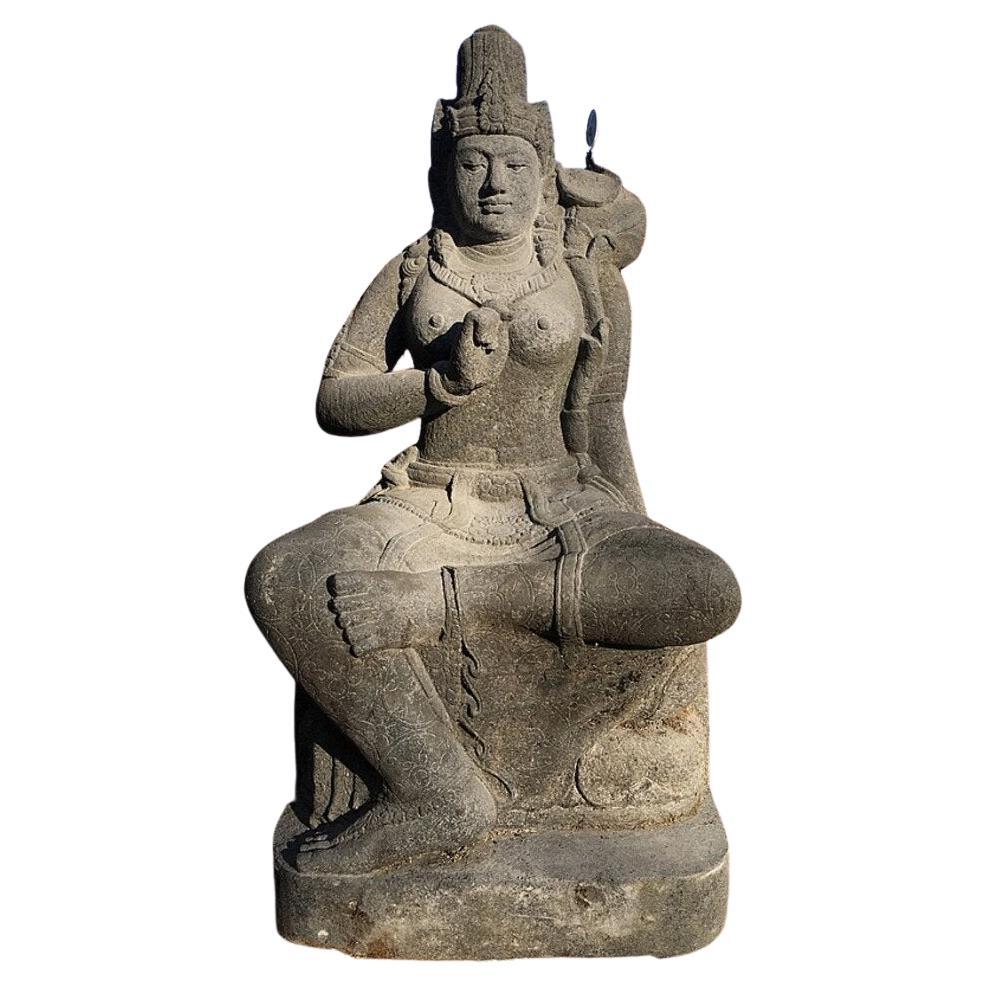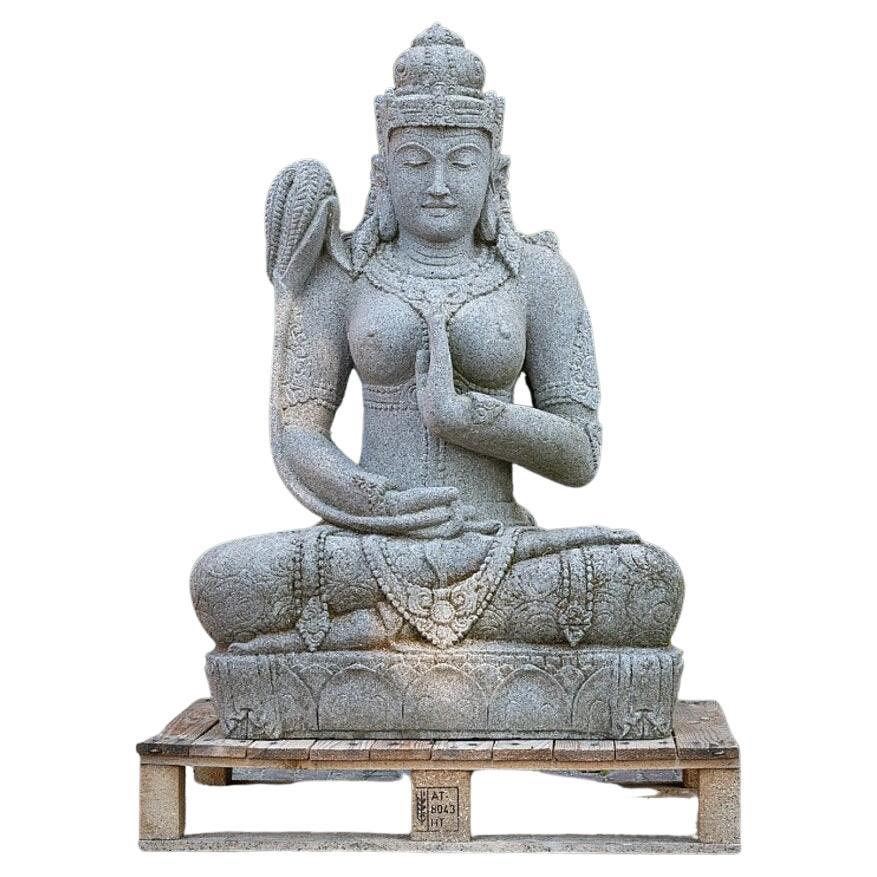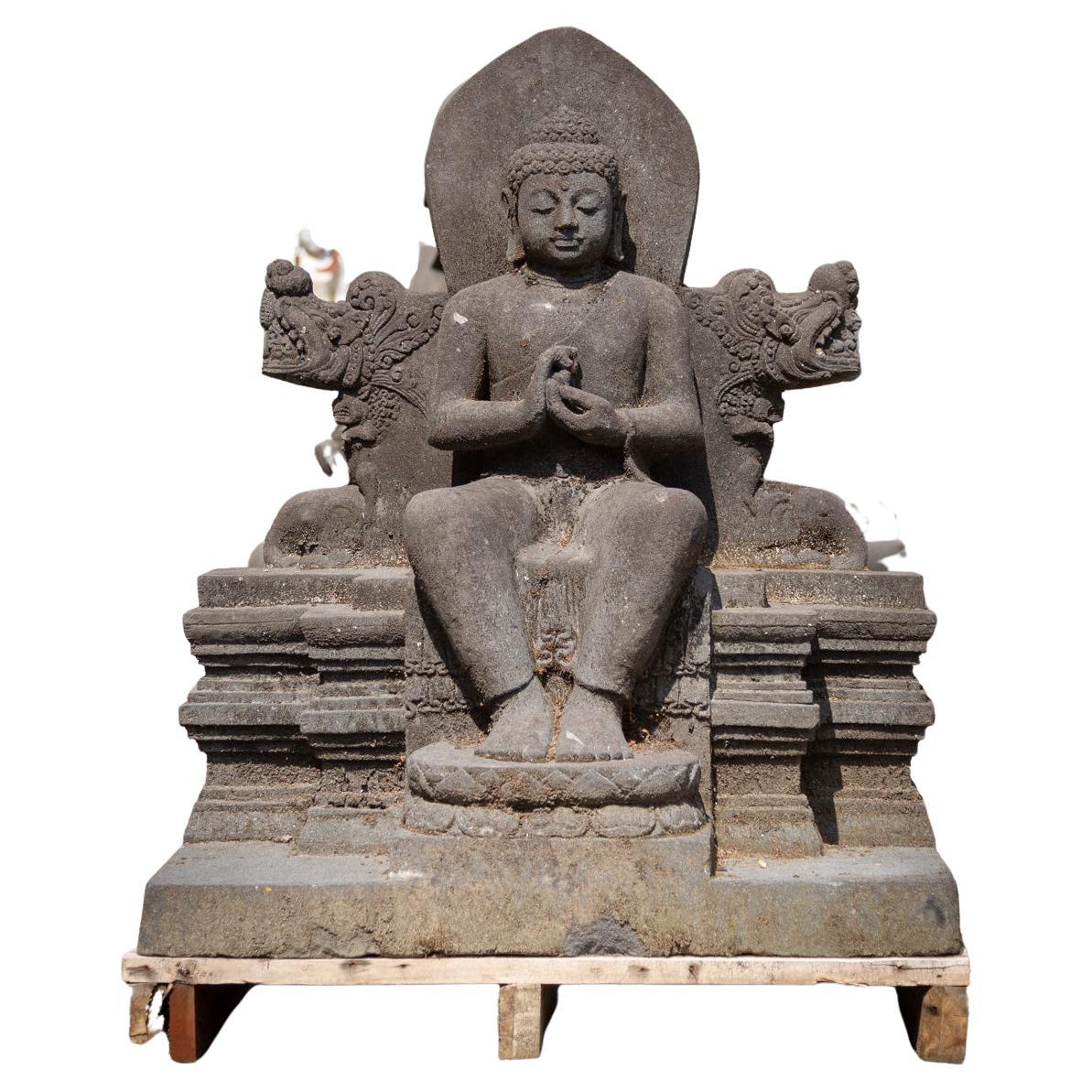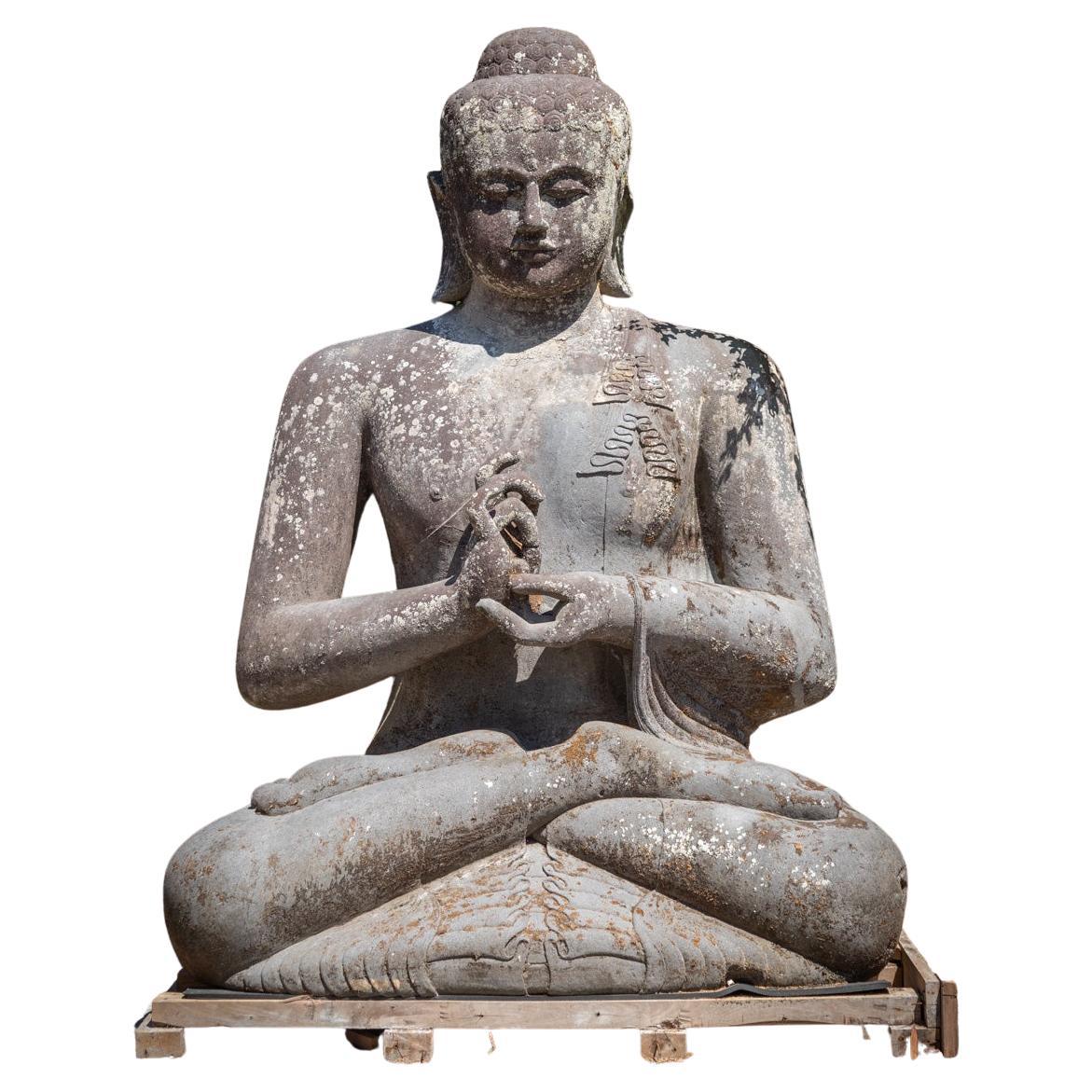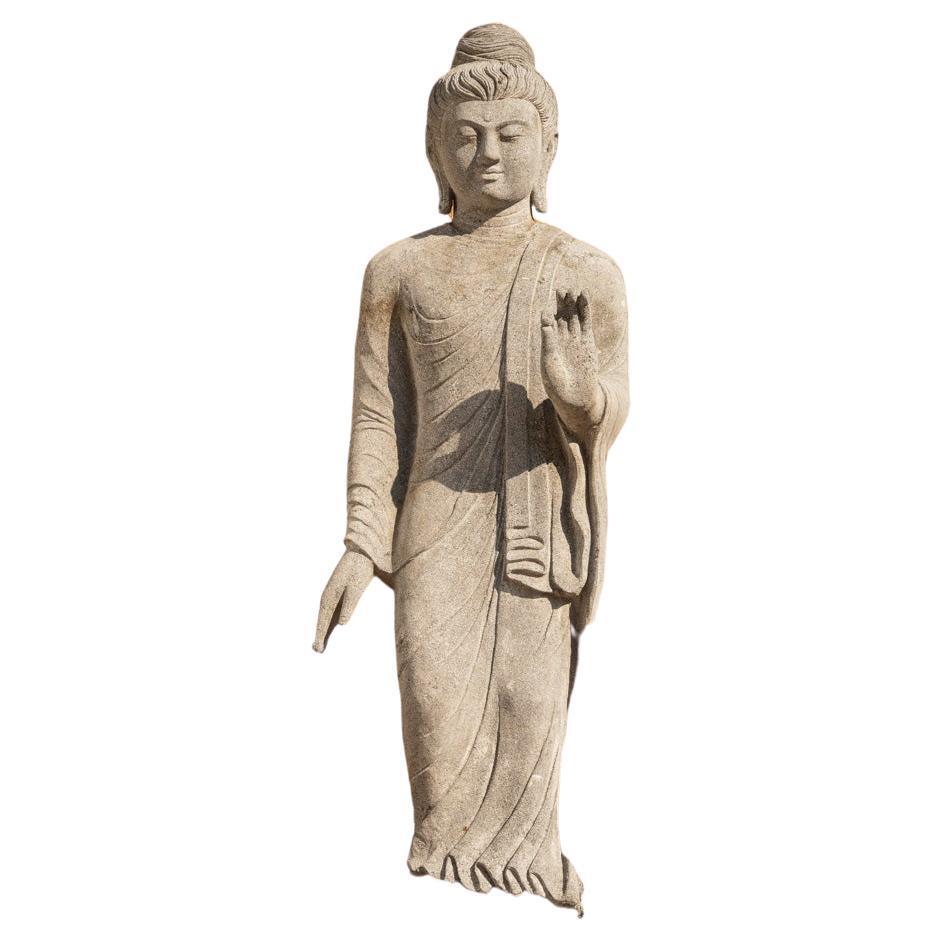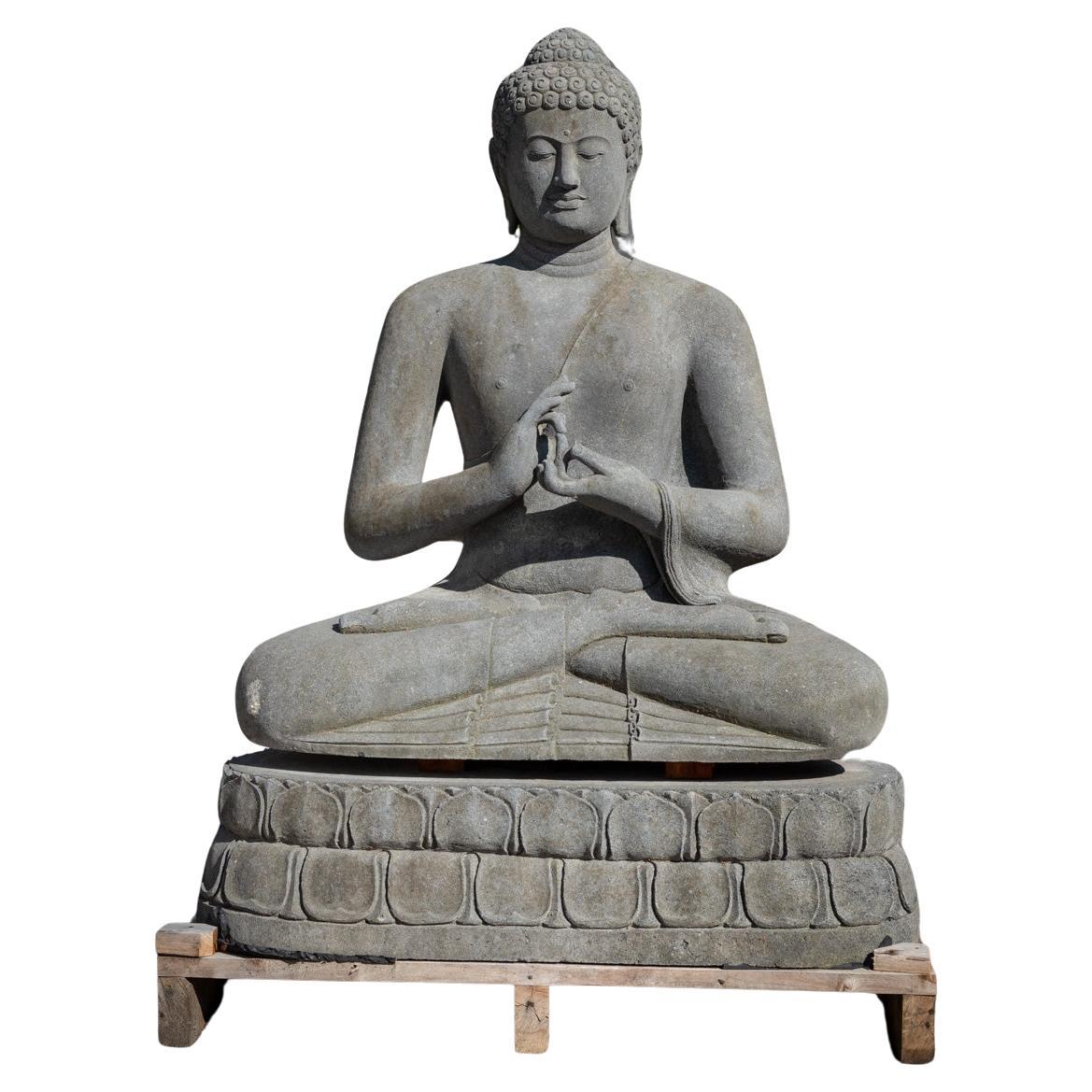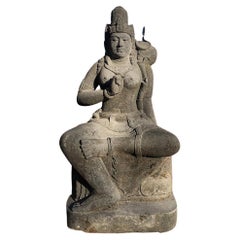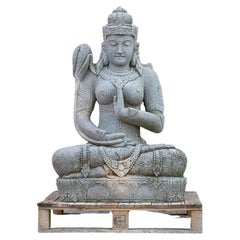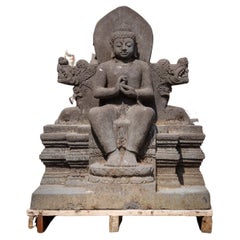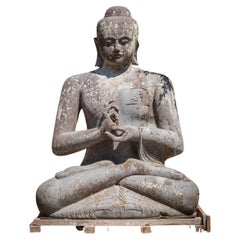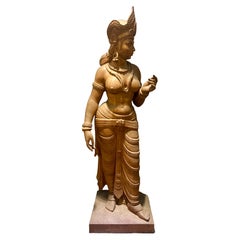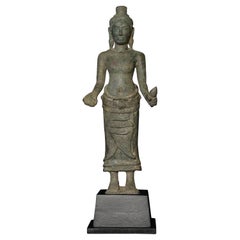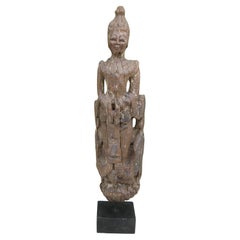Items Similar to Large Lavastone Tara Statue from Indonesia Original Buddhas
Video Loading
Want more images or videos?
Request additional images or videos from the seller
1 of 22
Large Lavastone Tara Statue from Indonesia Original Buddhas
$16,403.05
£12,215.16
€13,800
CA$22,646.63
A$25,107.13
CHF 13,194.78
MX$307,270.15
NOK 164,789.37
SEK 154,671.31
DKK 105,068.60
About the Item
This antique lavastone Buddha statue is a truly unique and special collectible piece. Standing at 215 cm high, it is made of lavastone, a volcanic rock known for its durability and unique texture. The base of this statue measures 62 cm wide and 48 cm deep and it is estimated to weigh around 800 kg. Believed to originate from Indonesia, this statue dates back to the middle of the 20th century. It is a perfect example of Indonesian craftsmanship and religious art. The statue is a rare find for any collector of antique Asian art and will be a treasured addition to any collection. With its beautiful craftsmanship, historical significance, and unique features, this antique lavastone Buddha statue from Indonesia is a must-have for any collector who appreciates the art and culture of Indonesia. The statue can be shipped worldwide.
Statue Details:
Material: lavastone
215 cm high
The base is 62 cm wide and 48 cm deep
Estimated weight : +/- 800 kg
Originating from Indonesia
Middle 20th century
Can be shipped worldwide.
- Dimensions:Height: 84.65 in (215 cm)Width: 24.41 in (62 cm)Depth: 18.9 in (48 cm)
- Materials and Techniques:
- Place of Origin:
- Period:
- Date of Manufacture:Middle 20th Century
- Condition:Wear consistent with age and use.
- Seller Location:DEVENTER, NL
- Reference Number:Seller: 2957-11stDibs: LU7845232202162
About the Seller
5.0
Platinum Seller
Premium sellers with a 4.7+ rating and 24-hour response times
Established in 1997
1stDibs seller since 2022
60 sales on 1stDibs
Typical response time: 6 hours
- ShippingRetrieving quote...Shipping from: DEVENTER, Netherlands
- Return Policy
Authenticity Guarantee
In the unlikely event there’s an issue with an item’s authenticity, contact us within 1 year for a full refund. DetailsMoney-Back Guarantee
If your item is not as described, is damaged in transit, or does not arrive, contact us within 7 days for a full refund. Details24-Hour Cancellation
You have a 24-hour grace period in which to reconsider your purchase, with no questions asked.Vetted Professional Sellers
Our world-class sellers must adhere to strict standards for service and quality, maintaining the integrity of our listings.Price-Match Guarantee
If you find that a seller listed the same item for a lower price elsewhere, we’ll match it.Trusted Global Delivery
Our best-in-class carrier network provides specialized shipping options worldwide, including custom delivery.More From This Seller
View AllLarge Lavastone Devi Tara Statue from Indonesia
Located in DEVENTER, NL
Material: lavastone
121 cm high
60 cm wide and 50 cm deep
Originating from Indonesia
Newly hand carved from a single block lavastone
Estimated weight : +/- 200 kg
Can be shipp...
Category
21st Century and Contemporary Indonesian Sculptures and Carvings
Materials
Lava
Lavastone Statue of Dewi Sri from Indonesia Original Buddhas
Located in DEVENTER, NL
Material: lavastone
97 cm high
63 cm wide and 39 cm deep
Dewi Sri is also called the 'rice goddess'
Originating from Indonesia
Early 21st century
H...
Category
21st Century and Contemporary Indonesian Sculptures and Carvings
Materials
Lava
Mid-20th century large old lavastone Buddha statue from Indonesia
Located in DEVENTER, NL
The large old lavastone Buddha statue commands attention with its majestic presence, carved from durable lavastone that has withstood the test of time. Standing at an impressive heig...
Category
Mid-20th Century Indonesian Sculptures and Carvings
Materials
Lava
Mid 20th Century Very large and special lavastone Buddha statue OriginalBuddha
Located in DEVENTER, NL
Very large and special lavastone Buddha statue
Material : lavastone
220 cm high
160 cm wide and 112 cm deep
Estimated weight : +/- 3000 kg
Dharmachakra mudra
Middle 20th century
Hand...
Category
Mid-20th Century Indonesian Sculptures and Carvings
Materials
Lava
Very large and special lavastone Buddha statue from Indonesia OriginalBuddhas
Located in DEVENTER, NL
The lavastone Buddha statue is an impressive piece originating from Indonesia. It stands at a height of 200 cm, with dimensions of 54 cm in width and 52 cm in depth. Hand-carved from...
Category
2010s Indonesian Sculptures and Carvings
Materials
Stone
Newly made Large lavastone Buddha statue from Indonesia OriginalBuddhas
Located in DEVENTER, NL
The lavastone Buddha statue from Indonesia is an exceptional piece of art that showcases the unique beauty of lavastone craftsmanship. Carved from lavastone, this magnificent statue ...
Category
21st Century and Contemporary Indonesian Sculptures and Carvings
Materials
Lava
You May Also Like
Antique Lopburi Buddha Statue from Thailand
Located in Atlanta, GA
The Buddha statue was made from a copper alloy in a standing position with hands in double Abhaya mudra. This mudra symbolizes the act of dispelling fear in the face of adversity. In Laos and Thailand where this mudra are used as one of the most iconic gestures, with its origin was pre-Buddhism era, when it was a symbol of good intentions and friendship when approaching strangers. In contrast to Indian iconography, it was often shown with both hands raised to the level of the shoulder in Southeast Asia. The statue was made in the classic Lopburi style, which historically was heavily influenced by Khmer art...
Category
Antique Late 18th Century Thai Other Sculptures and Carvings
Materials
Metal
A life-size carved wood sculpture of the Hindu goddess Parvati
Located in Los Angeles, CA
A life-size carved wood sculpture of the Hindu goddess Parvati. Parvati, the consort of Lord Shiva, is often depicted as a symbol of divine strength, love, and fertility in Hindu myt...
Category
Late 20th Century Indian Statues
Materials
Wood
Very Fine 11-13thC Cambodian Uma Statue - 8323
Located in Ukiah, CA
Very fine 11-13thC Cambodian Uma statue. Beautiful face, and strong spiritual presence. Left arm shows where it was originally attached during manufacture. It is only noticeable upon...
Category
Antique 15th Century and Earlier Cambodian Antiquities
Materials
Bronze
Ancient Thai Burmese Southeast Asia Temple Goddess Deity Wood Statue Sculpture
Located in San Diego, CA
Fine ancient Thailand. deity temple buddha hand carved wood statue/sculpture fragment. Wonderful shape and form. Has wear from age but displays well. Some remains of a paint or mater...
Category
Antique 15th Century and Earlier Thai Antiquities
Materials
Wood
Large Marble Statue of Kwan Yin Avalokiteshara
Located in Somis, CA
A beautiful, hand carved, solid white marble statue of Bodhisattva Kwan Yin Avalokiteshara, the Water Moon Goddess of Great Compassion. The sublimely carved face retains traces of th...
Category
20th Century Chinese Tang Sculptures and Carvings
Materials
Marble, Stone
$4,400 Sale Price
60% Off
A Large Chinese Carved Wood Figure of Guanyin, Late Qing Dynasty
Located in ARMADALE, VIC
Description:
A singular example of Guanyin. Deviating from the Bodhisattva’s conventional pose of ‘royal ease’, the figure is instead seated in the meditative padmasana, or ‘lotus position’, rendering this Guanyin something of a rarity. An Apana more typically associated with depictions of Buddhas, Guanyin assuming this pose immediately signifies this figure as one of particular spiritual reverence. Both feet are revealed crossed upon one another from beneath fabric which spills before her, her left palm turned upward with her hand resting upon her left knee and her right raised in a relaxed gesture. Adorned with a diadem housing a depiction of Amitabha Buddha, her own spiritual guide, she exudes an air of tranquil regality, further characterised by her numerous strings of beads and elaborately fastened dhoti, attire traditionally reserved for Indian princes. Though the figure’s dress is Indian her face is undoubtedly exemplifying artistic Chinese beauty standards. Her face is soft and rounded, full in both the lips and cheeks, with eyes that restfully peer down, as though she is watching over the worries of mankind with compassion.
Notes on the item:
Guanyin is the Chinese interpretation of Avalokiteshvara, the Indian Bodhisattva of compassion. The term “Bodhisattva” is derived from the Sanskrit “Bodhi”, meaning ‘awakening’ or ‘enlightenment’, combined with “Sattva”, meaning ‘spirit’ or ‘being’, referring to one on the path to achieving enlightenment. Bodhisattvas in Mayahana Buddhism are recognised as figures who have effectively achieved enlightenment yet relinquish their accension to nirvana in order to remain amongst mankind in the ultimate act of compassion to aid as spiritual guides. As such, the Bodhisattva inhabit a liminal space between samsara and nirvana; enlightened beings that maintain a relationship with humanity that buddhas cannot, as attaining Buddhahood necessitates the abandonment of all worldly attachments, including mankind. Guanyin’s very name, ‘One who hears the cries of the world’ highlights this role as a compassionate figure who acknowledges the suffering and strife of man. Along with Mahāsthāmaprāpta, a fellow bodhisattva, Guanyin serves as an attendant to Buddha Amitabha, with these three deities recognised as the Three Sages of Western Pure Land Buddhism, a sect of Mayahana Buddhism popular in East Asia.
Avalokiteshvara is commonly posited to have been adopted from Indian Buddhism into China as Guanyin around 200-400 CE, however it was the Tang dynasty (618-907) which saw the popularisation of the deity. By the Ming (1358–1644) and Qing (1644–1911) dynasties, Guanyin held the position as the most popular female deity in China. The unique state of religion in China held no monolithic canon regarding Buddhism and saw the assimilation of several belief systems, primarily Daoism, Buddhism and Confucianism. Consequently, Guanyin became a deity to be revered beyond Buddhism alone, appointed as both an official imperial deity and Daoist deity in the 12th century. Guanyin may also be seen to fulfil the role of idealised femininity as prescribed by Confucianism, with the scarcity of female Chinese deities perhaps accounting for the gradual gender shift Guanyin underwent.
The Indian Avalokiteshvara is unequivocally recognised as male, whilst the supposed gender of Guanyin remains contentious. Although there is a clear shift from the masculine Avalokiteshvara towards a more feminine representation, it is unclear if Guanyin is understood to be entirely feminine, to inhabit qualities of both genders or to be elevated beyond gender entirely, embodying neither. Depictions of Guanyin are highly androgynous, which some believe lends credence towards Guanyin symbolising the unity of dualistic forces as recognised in Daoism, displaying the anthropomorphism of yin and yang.
Comparative Analysis:
Market comparisons of similar Qing Dynasty polychrome figures of Guanyin include lot 767 (no.2) From Christies ‘Important Chinese Ceramics and Works of Art,’ New York, 25 March 2022, with the price realised USD 52,920 (Estimate USD 20,000 – USD 30,000). Christies also auctioned a comparable polychrome Guanyin...
Category
Antique Late 19th Century Chinese Qing Sculptures and Carvings
Materials
Hardwood
More Ways To Browse
Indonesian Antiques
Large Indonesian
Large Asian Statues
Antique Indonesian Art
Large Buddha Statue
Standing Buddha Statue
Tara Sculpture
Indonesian Statue
Indonesian Buddha
Tara Statue
Antique Hindu
Antique Dragon Head
Chinese Stone Carvings
Monk Sculpture
Stone Carving Head
Mid Century Buddha
Prayer Sculpture
Antique Japanese Stone
